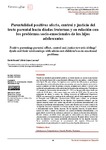Mostrar o rexistro simple do ítem
Parentalidad positiva: afecto, control y justicia del trato parental hacia díadas fraternas y su relación con los problemas socio-emocionales de los hijos adolescentes
| dc.contributor.author | Posada, David | |
| dc.contributor.author | López-Larrosa, Silvia | |
| dc.date.accessioned | 2024-03-05T06:40:48Z | |
| dc.date.available | 2024-03-05T06:40:48Z | |
| dc.date.issued | 2023-03-31 | |
| dc.identifier.citation | Posada, D. y López-Larrosa, S. (2023). Parentalidad positiva: afecto, control y justicia del trato parental hacia díadas fraternas y su relación con los problemas socio-emocionales de los hijos adolescentes. Revista de Investigación en Educación, 21(1). 48-61. | es_ES |
| dc.identifier.issn | 1697-5200 | |
| dc.identifier.uri | http://hdl.handle.net/2183/35788 | |
| dc.description.abstract | [Resumen] Cuando se estudia la parentalidad positiva, no suele tenerse en cuenta la percepción que los hijos/as tienen del comportamiento diferencial de sus padres y madres hacia cada hijo/a. En este trabajo, los objetivos eran analizar las diferencias en problemas externalizantes e internalizantes de los hermanos/as, así como la relación entre afecto, control y justicia del trato de padres y madres, el ajuste entre afecto y control y los problemas externalizantes e internalizantes de hermanos/as adolescentes. Participaron 111 parejas de hermanos/as adolescentes (N = 222), en las que el/la mayor tenía una media de 15,18 años y el/la menor tenía una media de 12,85 años. Se usaron las subescalas de afecto y control del Sibling Inventory of Differential Experience (SIDE), se crearon ad-hoc medidas de la justicia del trato de los progenitores y se usó el Strengths and Difficulties Questionnaire (SDQ) para evaluar los problemas internalizantes y externalizantes de los hijos/as. Los resultados indicaron que los hijos/as mayores tenían una media más elevada en problemas internalizantes y los menores en problemas externalizantes. Cuanto más elevado era el control materno de los hijos/as mayores comparado con los/las menores, más problemas externalizantes e internalizantes tenían los/las mayores. En los hijos/as mayores, el ajuste afecto-control de padre y madre se relacionó con menos problemas externalizantes, y el ajuste afecto-control de las madres se relacionó con menos problemas internalizantes. El trato materno percibido como más justo se relacionaba con menos problemas internalizantes y externalizantes de los hijos/as menores. El ajuste afecto-control del padre se relacionó con menos problemas internalizantes de los hijos/as menores. Estos resultados contribuyen al conocimiento del impacto diferencial del comportamiento parental positivo cuando tienen dos hijos/as adolescentes. | es_ES |
| dc.description.abstract | [Abstract] When approaching positive parenting behaviors, the perception that children have of their parents’ differential relations towards each sibling is overlooked. In this study, the objectives were to analyse siblings’ differences in externalizing and internalizing problems as well as to analyse the relationship between the affect, control and justice of the parents’ behaviors, the adjustment between affect and control, and adolescents’ siblings externalizing and internalizing problems. Participants were 111 pairs of siblings (N = 222), in which the oldest sibling was 15,18 years old on average, while the youngest sibling was 12,85 years old on average. The subscales of affect and control of the Sibling Inventory of Differential Experience (SIDE), ad-hoc measures of parental justice towards each child and the externalizing and internalizing problem measures of the Strengths and Difficulties Questionnaire (SDQ) were used. Results showed that the oldest siblings had higher mean scores in internalizing problems while the youngest siblings had higher mean scores in externalizing problems. The higher the maternal control towards her oldest child compared to the youngest one, the more the externalizing and internalizing problems of this oldest child. In the oldest siblings, the parents’ affect-control adjustment related to less externalizing problems, and the mother’s affect-control adjustment related to less internalizing problems. Maternal treatment perceived as fairer towards her children related to less internalizing and externalizing problems of the youngest child, while the father’s affect-control adjustment related to less internalizing problems in their youngest child. These results contribute to our knowledge about the differential impact that positive parenting has when parents have two adolescent children. | es_ES |
| dc.language.iso | spa | es_ES |
| dc.publisher | Universidade de Vigo | es_ES |
| dc.relation.uri | https://doi.org/10.35869/reined.v21i1.4531 | es_ES |
| dc.rights | Creative Commons Attribution-NonCommercial-NoDerivs 4.0 International License (CC-BY-NC-ND 4.0) | es_ES |
| dc.rights.uri | https://creativecommons.org/licenses/by-nc-nd/4.0/ | |
| dc.subject | Adolescencia | es_ES |
| dc.subject | Comportamiento parental | es_ES |
| dc.subject | Familia | es_ES |
| dc.subject | Hermanos | es_ES |
| dc.subject | Adolescence | es_ES |
| dc.subject | Parental behaviour | es_ES |
| dc.subject | Family | es_ES |
| dc.subject | Siblings | es_ES |
| dc.title | Parentalidad positiva: afecto, control y justicia del trato parental hacia díadas fraternas y su relación con los problemas socio-emocionales de los hijos adolescentes | es_ES |
| dc.title.alternative | Positive parenting: parental affect, control and justice towards siblings’ dyads and their relationships with adolescent children’s socio-emotional problems | es_ES |
| dc.type | info:eu-repo/semantics/article | es_ES |
| dc.rights.access | info:eu-repo/semantics/openAccess | es_ES |
| UDC.journalTitle | Revista de Investigación en Educación | es_ES |
| UDC.volume | 21 | es_ES |
| UDC.issue | 1 | es_ES |
| UDC.startPage | 48 | es_ES |
| UDC.endPage | 61 | es_ES |
Ficheiros no ítem
Este ítem aparece na(s) seguinte(s) colección(s)
-
GI-IPRF - Artigos [139]






